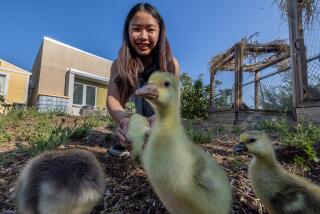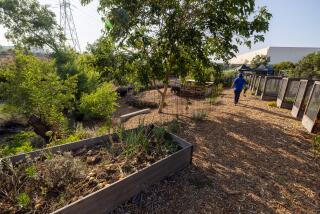SOUTH : Students’ Science Project Gets a Boost
- Share via
Teacher Brendhen Van Loo had just exchanged wedding vows last summer when he discovered the launching pad to send his students’ science project into space.
Van Loo was greeting friends at his reception in Colorado when he and a friend, Mike Voorhees, began discussing his Jefferson High School students. Voorhees is a scientist at BioServe Space Technologies.
Voorhees suggested the two work together on a project that would allow students to take part in the Scientific Opportunities for At-Risk Students (SOAR), a nationwide project that provides inner-city students a chance to explore research using state-of-the-art equipment. The students’ $12,000 project was funded by a grant from Southern California Edison and BioServe, a center for commercial development of space at the University of Colorado at Boulder.
Nearly a year later, Van Loo and 10 of his students traveled to the Kennedy Space Center in Florida to watch their science project take off March 8 aboard the space shuttle Columbia.
“This was the first time I did something like this,” said Ramiro Garate, 14, referring to the five-day trip that included touring the space center and meeting some of the scientists there. “Usually you observe things, but this was different.”
Astronauts helped in the project by inducing the hatching of killifish, small carnivorous fish whose eggs can be held in a state of suspended animation until ready to hatch. The project will look at how the eggs survive in this state until they are exposed to water. The process is a natural defense to combat the evaporation of water in their habitat of Zanzibar. This week the students prepared to look at the results.
In January, Van Loo recruited 14- to 18-year-old students who were willing to work on a science project over their vacation. For nearly a month students volunteered up to four hours daily, helping prepare liquid solutions that would work in space and document their experiment, Van Loo said.
For Van Loo and students like Garate, the aim of the project is to foster a hands-on approach to science and get them hooked on it.
“This teaches them organizational skills they’ll need to survive in college,” Van Loo said. “They’ve been taught how to keep good records, and you have to document everything in college. Those are the people that succeed.”
More to Read
Sign up for Essential California
The most important California stories and recommendations in your inbox every morning.
You may occasionally receive promotional content from the Los Angeles Times.









